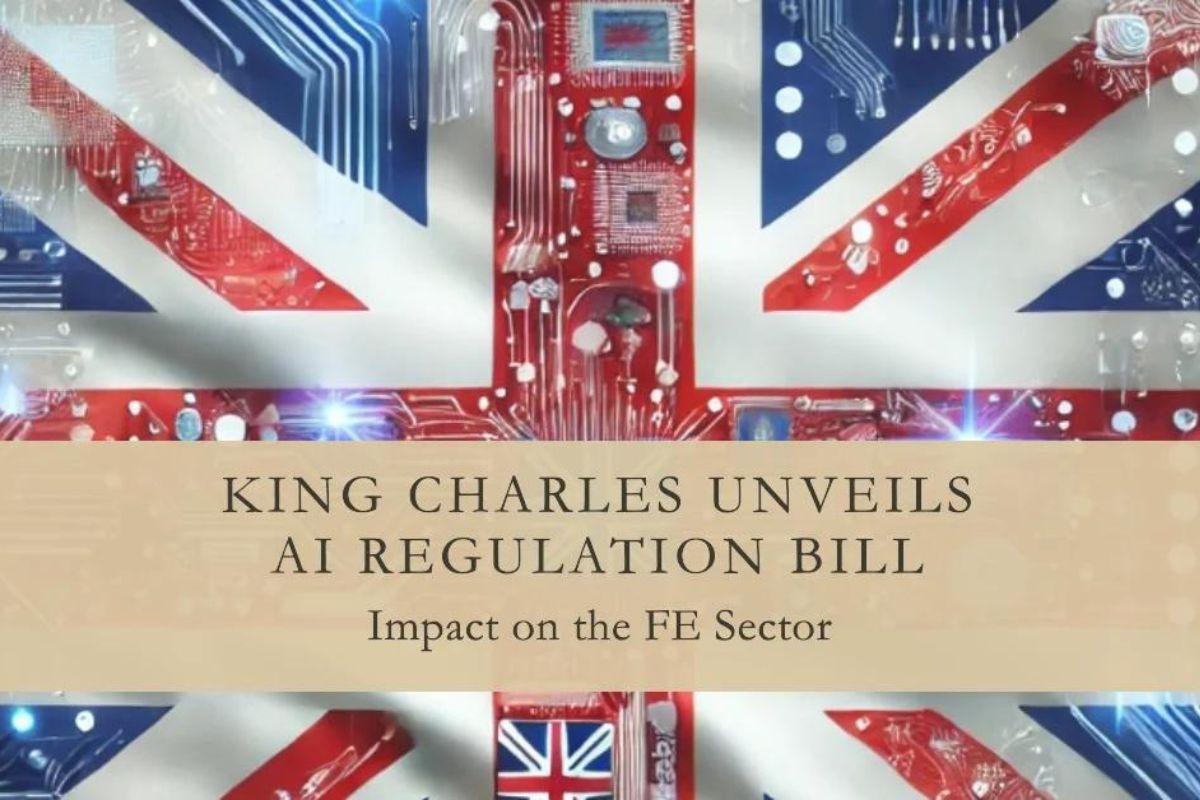King Charles Unveils AI Regulation Bill: Impact on the FE Sector

In his recent King’s Speech, King Charles unveiled the UK’s plans to introduce a new AI regulation bill. This proposed legislation aims to establish comprehensive regulations for powerful AI models, ensuring a balance between innovation and safety.
The announcement, made during the State Opening of Parliament, sets the stage for Prime Minister Keir Starmer’s government to address the rapidly evolving field of AI. The bill represents a significant shift towards targeted legislation, building on previous initiatives such as the AI Safety Institute and the AI Safety Summit at Bletchley Park.
King Charles emphasised the need to balance innovation with safety and ethical considerations. The bill aims to create a regulatory framework that does not stifle technological advancements while ensuring robust oversight.
The AI community’s response has been mixed. Nathan Benaich of Air Street Capital supports the cautious approach, highlighting the UK’s competitive advantage in maintaining a sector-based regulatory framework. Conversely, Gaia Marcus from the Ada Lovelace Institute stresses the urgency of implementing new legislation due to AI’s rapid integration into daily life and public services.
From my perspective, it is always disappointing when leaders view regulatory frameworks as obstacles to innovation. In reality, when executed well, they fuel innovation. For example, the General Data Protection Regulation (GDPR) in Europe has spurred advancements in data privacy technologies and practices. Similarly, the Clean Air Act in the United States has driven significant innovations in pollution control technologies. These regulations not only ensure safety and ethical standards but also encourage creative solutions and technological advancements.
I’m uncertain how effectively the UK and other countries will legislate AI if they believe they must avoid interfering with AI companies to encourage groundbreaking innovation. It’s crucial to remember that these companies are using and profiting from our data. Effective legislation is essential to ensure that AI companies innovate responsibly and ethically while safeguarding public interest and data privacy. Regulations should not be seen as barriers but as necessary measures to protect individuals and promote fair use of the data that fuels these technologies.
For the further education (FE) sector, this legislation presents both challenges and opportunities. AI integration in FE colleges has largely been positive, with many colleges embracing the opportunities for efficiency gains and support with lesson planning across the teaching staff throughout 2024. Our organisation, MKAI, is currently working with FE Leaders across the country to support their colleges’ AI journeys, with many CEOs now asking us to focus on how the business and student support services departments can also integrate AI.
However, colleges must be aware of how new legislation could affect the use of AI tools handling sensitive student data. This includes understanding compliance requirements for data privacy and security. Students will expect teachers to adhere to these guidelines rigorously, particularly in areas like assessment and marking. The legislation aims to ensure that AI applications are used responsibly, maintaining the integrity and confidentiality of student information. This heightened awareness and expectation will require colleges to implement robust data governance frameworks and provide ongoing training for staff to navigate these new regulatory landscapes effectively. Ensuring adherence to these guidelines will be crucial in maintaining student trust and the ethical use of AI in education.
As the UK moves forward, it is crucial for the FE sector to stay informed and actively involved. College leaders should not be reactionary; instead, they should proactively put forward recommendations and guidelines that align with new AI regulations. Collaboration between policymakers, educators, and AI experts will be essential in creating a regulatory environment that fosters innovation while protecting the interests of learners and educators. This proactive approach will ensure that AI technologies are used ethically and effectively, benefiting the entire educational landscape.
The new AI regulation bill represents a pivotal moment for the FE sector. By balancing innovation with ethical oversight, colleges can harness AI’s transformative potential while ensuring the responsible use of sensitive data. This legislative framework provides an opportunity to reinforce trust and transparency in AI applications, particularly in education.
By Richard Foster-Fletcher, Chair of Morality and Knowledge in Artificial Intelligence (MKAI)











Responses